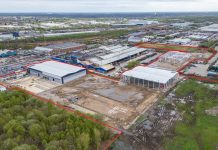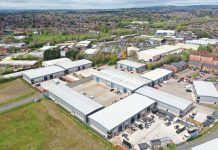“The full impact of Derby city centre’s current residential renaissance has changed the shape of its office footprint forever.”
This is one of a number of findings made in regional commercial property specialists Rigby & Co’s annual office review, which has just been released.
The team at Rigby & Co invest a huge amount of time every year to carefully plot and map take-up of office space in Derby city centre and across the Pride Park business district.
According to the report, over the last 12 months or so Derby’s city centre office footprint has shrunk by 20% as a result of a number of office conversions under permitted development rights which have helped to create Derby’s new City Living market.
In parallel, the amount of vacant space across the city centre has shrunk dramatically from 367,000 sq.ft in 2016 to 133,000 by January 2017.
Commenting on the highlights of this year’s latest office review, Russell Rigby, managing director of Pride Park-based Rigby & Co, said:
“The removal of certain office buildings to make way for residential apartments has been absolutely transformational in the last 12 months. This has led to Derby city centre’s office footprint now running at a level under that out at the Pride Park Business District.
“Pride Park continues to be a very popular location, with vacancy rates currently running at just under 3.5%, which itself is down from 12 months ago.
“The scale of a change is rather more than just an adjustment and reflects the popularity of the city centre as a place to live.
“However, with the on-going success of the Connect Derby managed workspace scheme and other serviced office schemes across the city centre, we are confident that demand for new office accommodation will grow from the second half of this year.
“This will put a strain on the supply of existing office space in the city centre and in our view, will provide a compelling case for new build development by 2018,” added Russell.
The study also included the analysis of 25 active office-based businesses on a like-for-like basis, including lease lengths, the importance of parking and the critical aspects which now drive office relocations.
These findings also point to sustained and increased demand for serviced offices against non-serviced offices.






















